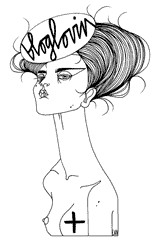Bring Up The Bodies by Hilary Mantel
20 February, 2014
After the triumph of Wolf Hall, it was hard to imagine how Hilary Mantel could top it. And yet she does and her second Booker Prize win, Bring Up The Bodies, shows how much ingenuity and talent lies in her work. Like its prequel Wolf Hall, Bring Up The Bodies is a robust book, charting the rise and fall of Anne Boleyn, mirrored through Thomas Cromwell’s eyes.
Here, Cromwell is middle-aged, former Secretary, now the Chancellor of the Exchequer at Henry VIII’s court; a confidante, a schemer, always practical, always cautious. There is compassion as well as reflection, and yet there is also a ruthlessness, necessary in order to survive in such deadly political climate. He has surrounded himself with people he trusts: his ward Ralph Sadler, nephew Richard, both capable and discreet, and later Gregory his son, who is being educated as a gentleman.
But he must deal carefully with Henry’s Queen, Anne, for she is suspicious, paranoid and hoards affronts. And intelligent enough to know that she can go down the same way she came up in the King’s affections. And when Henry’s eyes begin to rove following her miscarriages, Anne begins to prepare for war. Mantel paints Anne as a chilling figure, one who has the intelligence to match that of Cromwell and who keeps him on his toes.
And as Cromwell’s duties grow and his power increases, we begin to see the blurring of lines as his decisions in court become increasingly complex. With great power comes great responsibility and we begin to see what it is that changes in people as they go up the power ladder. The meaning of trust and friendship, secrets and lies, all begin to change. Cromwell thinks himself unchanged and yet we begin to see how it is that he begins to accumulate enemies, just like his old master, Thomas Wolsey, betrayed by those around him for having too much power.
Mantel’s portrayal of Cromwell as ultimately a solitary being, working hard for England and his King, often weighed down by the many decisions and yet unflinching regarding the path he must take, is an attractive one. He’s human and compassionate and yet set Anne Boleyn on her path to the executioner’s block. It’s subtly chilling because Cromwell doesn’t want to be the bad guy.
The fact that Wolf Hall is the country seat of the Seymour family can come as no surprise to Mantel’s readers. It spells Anne’s doom as much as Cromwell’s uncertain future. Like its prequel, Bring Up The Bodies won’t disappoint. It’s a juggernaut of a novel, rich in history, politics and survival strategy, just like its protagonist, Cromwell. It’s dense, intelligent and soulful and reads like a thriller. Just how does Mantel do it?












21 February, 2014 at 12:49 am
I found Wolf Hall tough going. This sounds to me a better proposition! Thanks for the review.
21 February, 2014 at 10:00 am
It’s a little shorter than the first book and there’s more tension – but the style is pretty much the same though. But I do hope you give it a go, Mystica!
28 February, 2014 at 11:03 pm
For some reason I rejected Wolf Hall when it came out. I usually stick with crime fiction anyway, but I do like the topic of this series of books. Maybe I thought there was too much hype. But reviews I have seen of this second book, including yours, have convinced me I need to read them. Great review.
3 March, 2014 at 11:41 am
There has been a lot of hype over Wolf Hall but well-deserved, in my opinion. I know the books divide readers sharply, but I do hope you give them a go just to see for yourself! It’s just so different from everything else out there.